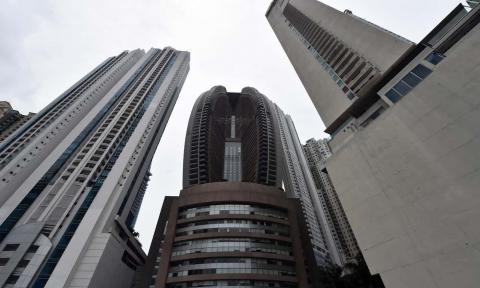The Trump Ocean Club International Hotel and Tower soars over Panama City bay, a 70-storey skyscraper shaped like a sail. Donald Trump’s first international hotel venture, it opened in 2011, a mix of condominiums, hotel rooms and a casino.
As one of the tallest structures in Latin America, it was a bold and lucrative expression of the Trump brand, earning him as much as $13.9m in management fees and royalties in the last three years.
By day it glints in the tropical sunshine, an apparently shining testament to the US president’s business savvy.
But a curious thing happens at night. Many of the lights stay off. The restaurants are near deserted; the corridors silent. The skyscraper appears to be largely empty – a dark tower.
Many of those who bought the condos, it turns out, did so not to live there but allegedly to launder illicit money – Russian gangster money, drug cartel money, people-smuggling money.
A joint Reuters-NBC News investigation published on Friday alongside a report by the non-profit Global Witness said the skyscraper with Trump’s name had ties to international organised crime.
The reports detailed how the future president gave the project to his daughter Ivanka as a “baby” effort to gain real estate experience, and said it ended up drawing a cast of characters accused of fraud, corruption and kidnapping.
Trump may not have intended to facilitate criminal activity but the Panama tower “aligned” his financial interests with crooks, said Global Witness. “Trump seems to have done little to nothing to prevent this. What is clear is that proceeds from Colombian cartels’ narcotics trafficking were laundered through the Trump Ocean Club and that Donald Trump was one of the beneficiaries.”
There is no evidence that the Trump Organization or members of the Trump family broke the law or knew of the criminal backgrounds of some of the tower’s brokers, buyers and investors.
The White House and Ivanka Trump referred requests for comment to the Trump Organization, which issued a statement distancing itself from the tower.
“The Trump Organization was not the owner, developer or seller of the Trump Ocean Club Panama project. Because of its limited role, the company was not responsible for the financing of the project and had no involvement in the sale of units or the retention of any real estate brokers.”
The story may endure. The president won last year’s election on the promise of draining corruption in Washington and building a wall to keep out drugs and undesirable immigrants. Robert Mueller, the special counsel who is investigating Russian influence in the election, is looking at Trump’s business dealings.
Trump lent his name but did not exert management control over the tower’s construction and was under no direct legal obligation to conduct due diligence on other people involved.
But Arthur Middlemiss, a former assistant district attorney in Manhattan and a former head of JP Morgan’s global anti-corruption program, told Reuters that since Panama was “perceived to be highly corrupt”, anyone engaged in business there should conduct due diligence on business collaborators. If they did not, he said, there was a potential risk in US law of being liable for turning a blind eye to wrongdoing.
Trump wanted to use the Panama project as a “baby” for Ivanka, Roger Khafif, a Panamian developer who pitched the deal to Trump in 2005, told Reuters.
She helped kickstart the project a year later by selecting a Brazilian former car salesman, Alexandre Ventura Nogueira, as a lead broker to sell units. He promised quick sales at high prices. Ventura’s firm, Homes Real Estate Investment & Services, delivered, selling 350 to 400 units, about $100m worth of property, he told Reuters and NBC.
He met Ivanka numerous times, met her brothers Eric and Donald Jr, and met the future president once, at a celebratory event in 2008 at Mar-a-Lago, the family’s Florida estate.
A year later, however, Ventura was arrested in Panama for real estate fraud, unrelated to the Trump project, and fled on bail.
Now a fugitive, the 43-year-old spoke from an undisclosed European city wearing a disguise.
Ventura said some of his brokers and clients who traded units in the Trump Ocean Club were connected to the Russian mafia and other organised crime groups.
He said he sold seven to 10 units to David Murcia Guzmán, a disgraced entrepreneur who is currently in US custody awaiting extradition to Colombia after being convicted by a US federal court of laundering money for drug cartels, including through real estate.
Ventura said he sold about half the units to Russian-speaking brokers, including Arkady Vodovozov, who, according to court files cited by Reuters, was convicted of kidnapping in Israel, and Igor Anapolskiy, who, according to Ukrainian court documents cited by Global Witness, was convicted in 2014 of forging travel documents.
Another was Stanislav Kavalenka, who, according to Ontario court documents, was charged in Canada with “compelling” and “procuring” women to engage in prostitution. The case was later withdrawn.
Many buyers remained unidentified because many units were bought and sold through anonymous shell companies. Ventura said he set up hundreds of such corporations, charging roughly $1,000 each.
“I had some customers with questionable backgrounds,” he said. “Nobody ever asked me. Banks never asked. Developer didn’t ask and (the) Trump Organization didn’t ask. Nobody ask: ‘Who are the customers, where did the money come from?’ No, nobody ask.”
Mauricio Ceballos, a former financial crimes prosecutor in Panama who investigated Ventura, told NBC the skyscraper was a “vehicle for money laundering”.
Alan Garten, the Trump Organization’s chief legal officer, played down Ventura’s connections with the Trumps, telling Reuters they did not remember meeting him, and that such contacts would have been “meaningless” and just one of hundreds of public appearances they make each year.
Rory Carroll is a US west coast correspondent based in Los Angeles. Click here for Rory Carroll's public key


Spread the word